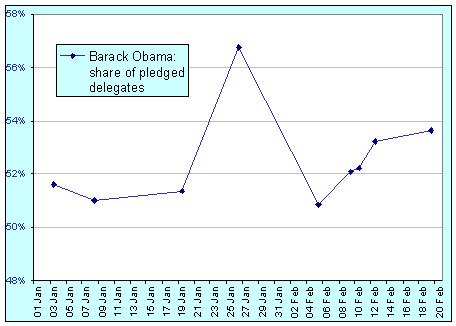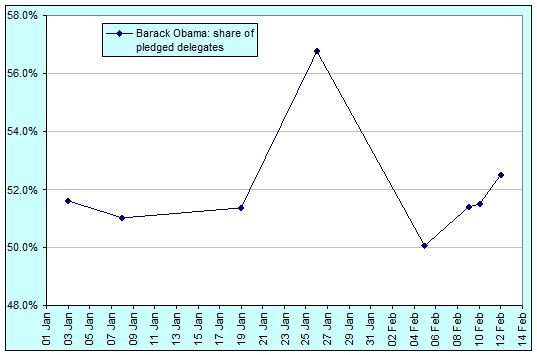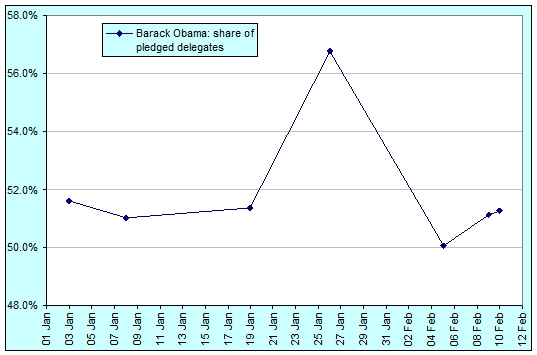I recently wrote that:
Hierarchies [of power] allow for genuine decision making over the endless, cacophonic debates of pure democracy, but they come at the cost of hampering information flow (at an extreme, it becomes unidirectional) and making people at the bottom feel ineffective or inconsequential. As a society, we seem to have settled on the idea of power being locally hierarchical, but globally competitive between those separate hierarchies.
I hypothesise that hierarchies are the constrained-optimal power structure for most, if not all, collaborative human endeavours. I imagine the optimal height and breadth of the hierarchy to be a function of the two, possibly intertwined, technologies at play: that used to aggregate individual beliefs to arrive at decisions, and that used to combine individual efforts to produce the output.
I likewise hypothesise that social networks are the optimal power structure for most, if not all, competitive human endeavours, with beliefs propagating across the network and decisions being made by individual nodes. I imagine the optimal network parameters (number of links per node, weighting per link, etc) to be functions of how similar the output of individual nodes are and the costs of maintaining each link.
Note that if the aggregate output for collaborative endeavours is a linear function of the output of each individual, then a hierarchy can be seen as a special case of a network with asymmetric link weightings: A takes more account of B’s view than B does of A’s. This raises the intriguing possibility of the two types of model being able to be nested. Do linear aggregation functions represent a definition of competitive endeavours?
I argue that these hypotheses are true on the simple basis that they are what we observe. Collaborative efforts are always hierarchical. Competitive efforts interact through networks. I’d invite any examples of counter-factuals. If there are any counterfactuals – if, for example, a power structure exists that is highly hierarchical (tall and narrow) when the optimal structure is much more network oriented – then the key question is ‘Why doesn’t it change?’. Why doesn’t the Coase theorem kick into gear?
There’s an obvious question of where and how democracy fits into my framing of the world. I imagine democracy as being something based on a social network. For any given shock (i.e. news), once the network of opinions stabilises, democracy is just the formal counting of which nodes believe what. Within this, though, I make a distinction between two different types of pure democracy. When the network is uniformly connected and every link carries the same weight, then every person truly carries the same value to the overall decision. By contrast, when the network is not uniformly connected and/or weights are different across links, then even if individuals get an equal vote each in the decision, their opinions will be biased towards those individuals with more links and more weights. Nevertheless, both situations count as “pure” democracy. Obviously any type of representative democracy represents a hierarchy. Even in the upper level where the democracy is played out there are sub-levels of deferred power. Witness the machinations and power-plays of the UK’s House of Commons.
Web 2.0 sites such as Wikipedia, Digg, Slashdot and del.icio.us represent an interesting experiment here because while they are clearly collaborative to some extent, they each claim, to varying degrees, to be purely democratic. The users both contribute content and decide which contributions are most important. There is an ongoing debate over who contributes most to such sites. One view, from people such as Aaron Swartz, argues that:
[Outsiders] make one edit to add a chunk of information, then insiders make several edits tweaking and reformatting it. In addition, insiders rack up thousands of edits doing things like changing the name of a category across the entire site — the kind of thing only insiders deeply care about. As a result, insiders account for the vast majority of the edits. But it’s the outsiders who provide nearly all of the content.
By contrast, Chris Wilson (of Slate) notes essentially the opposite view:
Palo Alto Research Center’s Ed Chi, the scientist who determined that 1 percent of Wikipedians author half of the content, told me he originally hypothesized that the site’s most energetic editors were acting as custodians. Chi guessed that these users mostly cleaned up after the people who provided the bulk of the encyclopedia’s facts. In reality, he found the opposite was true (PDF). People who’ve made more than 10,000 edits add nearly twice as many words to Wikipedia as they delete. By contrast, those who’ve made fewer than 100 edits are the only group that deletes more words than it adds. A small number of people are writing the articles, it seems, while less-frequent users are given the tasks of error correction and typo fixing.
But the debate over who contributes to Wikipedia and Digg is not of particular concern to me per se. My concern is the power structures of these sites and that is quite recognisable. Wikipedia has guiding editors who can lock pages down. Digg and Slashdot both employ moderators that get veto power over the user-voting. There is a formalised, structural hierarchy. What is interesting is that there also seems to be an informal hierarchy based on the volume of user contributions. The users that contribute more also get more of a voice when decisions are made. Quoting Chris Wilson’s Slate article again:
The influence of these members was particularly apparent last month. After Digg tweaked its secret sauce, top contributors noticed a decline in influence—fewer of their submissions became top stories. The super Diggers published an open letter of grievances and threatened to boycott the site. The changes in the algorithm, the Digg execs said, were meant to bring a more diverse set of stories to the site, and they begged for patience from the top Digg contributors. (Thus far, a shaky truce has endured.) The takeaway: Digg’s brass believe that the site, which purports to be the product of a broad-based community, will cease to run smoothly if a microscopic percentage of its user base stops participating.
The reasons for this are simple enough: Without the top contributors, the overall value of these sites would plummet. They therefore have far more bargaining power with the formal power structures of the site owners.


